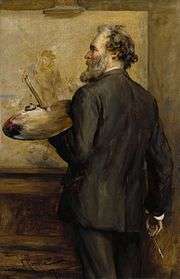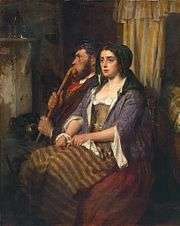Thomas Faed

by John Pettie

Tate Gallery.
Thomas Faed RSA (1826 – 1900) was a Scottish painter who is said to have done for Scottish art what Robert Burns did for Scottish song.[1]
Faed was born on 8 June 1826, in Gatehouse of Fleet, Kirkcudbrightshire, and was the brother of John Faed.[2]
He received his art education in the school of design, Edinburgh and was elected an associate of the Royal Scottish Academy in 1849. He went to London three years later, was elected an associate of the Royal Academy in 1861, and academician in 1864, and retired in 1893. He had much success as a painter of domestic genre, and had considerable executive capacity.
Three of his pictures, The Silken Gown, Faults on Both Sides, and The Highland Mother are in the Tate Gallery and a further two, Highland Mary and The Reaper hang in the Aberdeen Art Gallery. The Last of the Clan, completed in 1865 and arguably his best known work, is in the Kelvingrove Gallery in Glasgow.[3] He produced several versions of this work, including a smaller version now in The Fleming Collection.[4]
He died in London on 17 August 1900.
References
- ↑ "The Mitherless Bairn". Halifax, West Yorkshire, England: Calderdale Council. Retrieved 17 August 2011.
- ↑ McKay, William D. (1906). "the Faed brothers". The Scottish School of Painting. London: Duckworth and Co. pp. 443–449.
- ↑ "Thomas Faed: 1826 - 1900" Scotgaz. Retrieved 6 May 2008.
- ↑ The Fleming Collection
 This article incorporates text from a publication now in the public domain: Chisholm, Hugh, ed. (1911). "Faed, Thomas". Encyclopædia Britannica (11th ed.). Cambridge University Press.
This article incorporates text from a publication now in the public domain: Chisholm, Hugh, ed. (1911). "Faed, Thomas". Encyclopædia Britannica (11th ed.). Cambridge University Press.
The book "THE FAEDS" by Mary McKerrow published 1982 provides much information on Thomas Faed and the other Faed artists. It also contains many photographs of the artist's paintings. This is out of print but may be found in libraries.
External links
| Wikimedia Commons has media related to Thomas Faed. |
- 81 Paintings by Thomas Faed at the Art UK site
- Thomas Faed at artcyclopedia.com
- Phryne's list of paintings in accessible collections in the UK